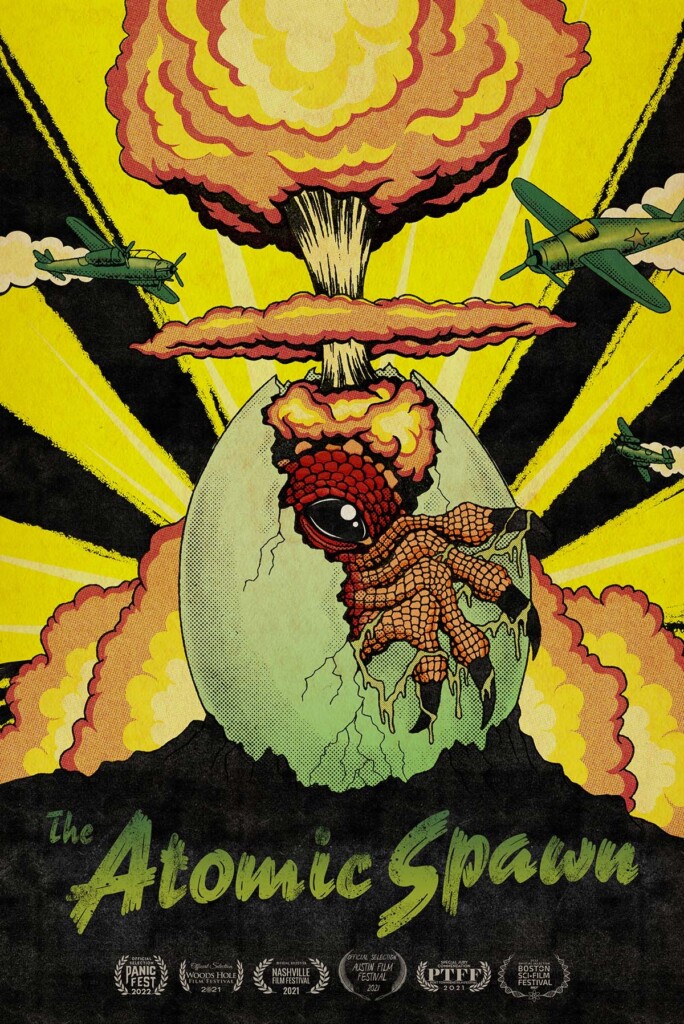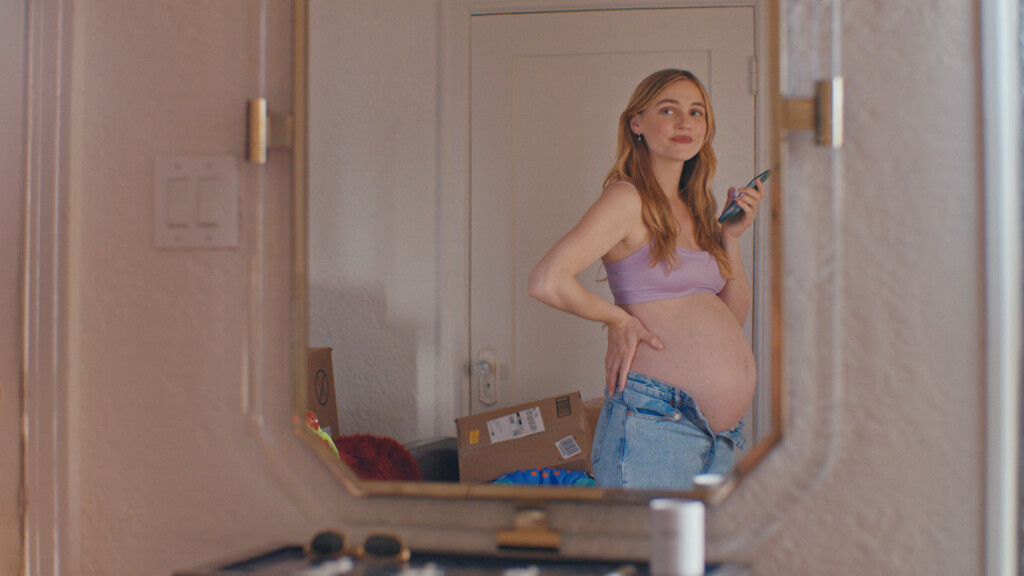Two independent short films – one by a Utah filmmaker who received a Next Level Grant from the Utah Film Commission and the other by a southern California filmmaker whose project premiered at this year’s Fear No Film program at the Utan Arts Festival – are featured.
Arthur Veenema: The Atomic Spawn
Utah filmmaker Arthur Veenema’s nostalgic connections to science fiction run the gamut from stories by Philip K. Dick to classic monster film franchises such as Godzilla. In his latest short film, The Atomic Spawn, which received an online premiere in June on the global Omeleto festival platform, Veenema synthesizes his love for old-school stop-motion animation with a story right out of the 1950s. The 2021 film (Overcranked Pictures) premiered at the Woods Hole Film Festival and went on to have a successful festival run, where it was selected at Oscar-qualifying lineups like the Austin Film Festival and Nashville Film Festival.
The 15-minute film evokes the period vibe with convincing effect and an elegantly layered narrative. It features John Nguyen, a scientist (played by Brandan Ngo) who is tasked with gauging the fallout effects of a nuclear test in the desert, set in 1952. His gruff, no-nonsense boss has decided that the scientist should test the worthiness of a fallout shelter to see if it shields sufficiently against radioactive effects. After a test blast, Nguyen has found an egg that survived and he takes it to the shelter. The egg hatches and a small monster emerges. The creature is curiously adorable but not for long. When it sneezes, it is like a fire-breathing dragon. But it is growing rapidly and Nguyen contemplates whether or not he should take the “specimen” back to his boss.
Veenema pitches an intelligent narrative with subtle bits of irony embedded in the relatively sparse amount of dialogue. In the early 1950s, even atomic physicists barely considered the extensive precautions that are tantamount today to protect against radioactive effects. The story is inflected with wry humor that makes the film a genuinely charming experience.
Veenema also achieves solid quality in production effects. Veenema wisely chose his location – the Tekoi Missile Range in Utah’s west desert, located 80 miles west of Salt Lake City. He and Yolanda Stange, the executive producer, worked with Sheila Urius and the Goshute Skull Valley Indian Reservation to facilitate production. The site has a controversial history. Some 25 years ago, the Goshute tribe had agreed provisionally to using it for storage of high-level nuclear waste but the opposition overwhelmed any chance of proceeding with the project, which eventually was canceled in 2012.
Casting also proved successful. Ngo has an excellent grasp on the scientist’s temperament who tries to avoid as best as possible any dramatic confrontations with a stubborn boss who cares little about people. Terence Goodman is excellent as the taskmaster.
Veenema received a Next Level Grant from the Utah Film Commission, which helped the filmmaker realize the vision he had crafted for the film. As for the creature, he explained, “I specifically looked at the work of Ray Harryhausen, a stop-motion visual effects artist, whose monsters always had their own charming character. His Beast From 20,000 Fathoms (1953) is often cited as an inspiration for Godzilla’s origin in 1954. And a lot of people will remember watching Clash of the Titans (1981) as kids, with the evil kraken fighting Perseus’ Pegasus.”
The grant was the stepping stone Veenema needed to secure financing for post-production work. For the stop-motion creature, he recruited Utah artist Patrick Charles whose space at the Poor Yorick Studios in South Salt Lake featured monster-like sculptures. Veenema also was able to tap Jake Proctor and Strawberry Sound for handling foley sound design and sound mixing.
Veenema, a 2015 graduate of the University of Utah, also works as a video producer at his alma mater and has worked in the local film industry, including on the production set for the Yellowstone television series. In 2018, for the Utah Arts Festival’s Fear No Film, he presented Tomorrow’s Shores, a seven-minute science fiction short that avoids the conventional dystopic narrative frame. Filmed near the Great Salt Lake and the Utah deserts, which regularly afford surreal and otherworldly images, the film is set in the future when the worst fears of the environmental degradation wrought by climate change have been manifested. His starting premise for making that film asks: How would explain what has happened in the world to a child?
Lauren Caster: Plan C
Social media platforms such as OnlyFans and JustForFans are fertile ground for many budding entrepreneurs, especially those who find sex work a worthy option to build up financial momentum and find some peace of mind in financial stability. And, the audience demand has plenty of kinks and fetishes involved which content creators are happy to oblige. Pregnancy is one of those common fetishes. For example, a Danish woman who has more than 195,000 fans on Instagram discovered that followers enjoyed photos of her while she was pregnant and decided to open an OnlyFans account where subscribers gladly paid money for more alluring and provocative pics. While some media reports have attempted to be judgmental and critical of such practices, many pregnant content creators have found understanding audiences and advocates who applaud them for their practical skills as entrepreneurs and for helping spread body positive messages.
Lauren Caster’s short film Plan C, which premiered at the Utah Arts Festival’s Fear No Film program in June, offers an excellent, witty, sensitive treatment on this social media phenomenon. Among the 71 films featured in this year’s Fear No Film’s slate, Caster earned a Grand Jury Honorable Mention for Bold and Honest Filmmaking. The film is slated to screen next at the Portland Film Festival, which has Comcast as a sponsor (Oct. 12-22).
Caster, who was seven months pregnant at the time of filming, stars, along with her co-writer Angie Simms, who plays her best friend. Undoubtedly, the writing and the acting emphasize why the nod for bold and honest filmmaking was justified. The story starts straightforwardly enough: A single unemployed woman finds out she is pregnant and is having terrible morning sickness. The father of the baby has no interest in living up to his responsibilities. She is trying to sort out her options with her friend who lives at the other end of her country. Her friend is financially secure and her career is going well but it is the friend’s casual mention that she once sold photos of her feet that sparks an idea.
It is midway through the film which runs just under 15 minutes when she decides to launch an OnlyFans account. At first, she appears on video with a wig and users are tipping her because they find her thick figure alluring but then when they discover she is pregnant, they are disgusted. Changing course, she decides to present her pregnant self in her most natural state, a move that obviously stimulates subscribers who instantly send tips and ask for more content. Encouraged by the affirming reaction, she decides to put her baby registry online for her fans to purchase items.
But, as Caster makes evident in the character she portrays, it is not just about business or financial survival but also about the pervasive stubborn taboos that prevent honest discussions about pregnancy. This includes depression, feelings of disconnection from friends and work colleagues and stress about body image confidence. As she explains in her director’s statement, “I was left feeling bamboozled from what I knew from other narratives because it was supposed to be a happy perfect time, right? This made me realize that we aren’t talking about it enough. What is actually normal and part of pregnancy is made to feel like you’re doing it wrong because of this lack of discussion.”
Caster, who lives in southern California, works as an actor as well as writer, producer and director. Donor Baby, which she wrote, produced and starred in two years ago, is available on Amazon Prime. The film is based on her own experiences of locating the donor father who contributed his sperm used to conceive her. Plan C marks her directorial debut.
In 2021, she won a competition for a development deal to make an original Lifetime TV movie, as part of a Pitchfest presented by The Wrap and Lifetime for emerging female filmmakers. The film is You’re Not Supposed To Be Here, a thriller featuring a lesbian couple who have just learned that they are pregnant and have decided to have a vacation at a cabin in the woods. It is in preproduction with Lifetime and A&E networks.




